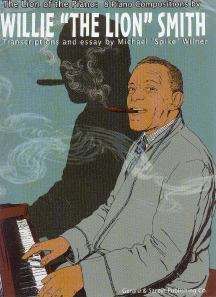|
|
|
"Willie 'The Lion" Smith made a major contribution to the history of jazz. He redefined the idiom of stride piano and left a legacy of signature compositions." Bill Charlap
"Willie 'The Lion' Smith has long been overlooked as a pianist, and especially as a composer. The pieces contained here demonstrate that The Lion was not just another stride piano player; he was a deep thinking musician, who had incredible range - technically, harmonically and emotionally."" Larry Goldings
"This fine collection reveals many of the stylistic and harmonic innovations of the great Willie 'The Lion' Smith. Spike Wilner has done a loving and wonderful job of transcribing these piano treasures." Dick Katz
PREFACE
When I first discovered Stride piano, now about forty years ago, Willie "The Lion" Smith was a paradox - at once ubiquitous and inaccessible. I bought a copy of his two-disc "Memoirs" in a now vanished Greenwich Village record store, and his autobiography was on the shelves of my local library. Even better, he appeared twice on network television. Once, he was Dick Cavett's guest, turning Cavett speechless in response to the Lion's inquiry if he spoke Yiddish. That avenue having proven a dead end, the Lion then launched into a nearly violent rendition of what may have been "Here Comes the Band." The other occasion was one of those Sunday afternoon documentaries purporting to explain jazz to the masses. Whether the masses were attentive to this I don't know, but they were offered one of the most unusual collections of idiosyncratic New York veterans imaginable: Wild Bill Davison, Tyree Glenn, Tony Parenti, Milt Hinton, Buzzy Drootin, and the Lion. In retrospect, it does seem that Giants Walked the Earth in 1971. But I arrived on the scene too late to see the Lion in person: his death in 1973 left Eubie Blake as official representative of the Good Old Days.
Perhaps if you are holding this book you have some awareness of his importance, but it goes beyond the obvious. Listeners acquainted with jazz of the great period only superficially might think it characterized primarily by rhythm, its unflagging beat taking precedence. Indeed, many performances seem to vacillate only between Loud and Fast. But the Lion's music is a charming antidote, suggesting a pastoral world. His rhythmic engines are never still, and the Commodore recordings on which this collection rests are at walking tempos. But both his melodies and his decorative embellishments are unusually elegant: no one sounds like him! Consider the pensive delicacy of the opening strain of "Fading Star." Played at a slower tempo by a small string ensemble, it would fit neatly into a chamber-music concert. The strains that begin "Rippling Waters," although taken briskly, are ornate and lovely. The compositions are marked by echoes of ragtime and turn-of-the-century parlor piano: multiple strains, tempo and volume changes, varied bass lines, dense interplay between both hands. But this is not to suggest that he was Debussy with a cigar- "Rippling Waters" becomes a stomping test piece to send other pianists back to their keyboards in gloom. And for those who rate the Lion the least of the great Stride triumvirate of Johnson and Waller, I direct them to "Sneakaway," which combines power, delicacy, and inventiveness.
The Lion recorded many times over a long career, and new performances are emerging on compact disc. However, I think these transcriptions are even more important, and not simply because the tradition of Western classical music that emphasizes notes on the paper for posterity. When listeners with even a rudimentary command of the piano hear Stride masterpieces for themselves, they are astonished - but the recordings may seem inaccessible. These transcriptions might bring the Lion's compositions within hailing distance of studious pianists, and I would like to imagine a many admiring listeners transforming themselves into the life of the party because they can play "Finger Buster." Perhaps it is unlikely, but now, thanks to Spike Wilner, this pleasing idea is that much closer to being realized, which is worth celebrating.
Michael Steinman
TABLE OF CONTENTS
Pg 7 - Preface
Pg 9 - Willie "The Lion" Smith: A Personal Relationship
Pg 19 - Echoes of Spring
Pg 27 - Concentrating
Pg 35 - Fading Star
Pg 41 - Sneakaway
Pg 49 - Passionette
Pg 55 - Rippling Waters
Pg 63 - Morning Air
Pg 71 - Finger-Buster
[ISBN 978-1-930080-03-4]
(C) Changing Tones. All rights reserved.
E-mail us with questions or comments.
Page design by MacIntyre Music
|

